|
|
|
Sort Order |
|
|
|
Items / Page
|
|
|
|
|
|
|
| Srl | Item |
| 1 |
ID:
115818
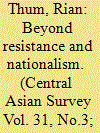

|
|
|
|
|
| Publication |
2012.
|
| Summary/Abstract |
Kashgar's seventeenth-century ruler-saint, Afaq Khoja, is remarkable for the amount of historical writing he has inspired, both outside and within Chinese Turkestan. His reputation among Uyghur historians is one of the few aspects of local Uyghur historical knowledge production that has attracted the attention of foreign scholars. In this essay the author uses the now-familiar example of Afaq Khoja's reputation to show that much of what is distinctive about local Uyghur approaches to history has been so little understood as to be missed even in this often-discussed case. This article describes how the local historical appropriation of Afaq's reputation, particularly the recording of narratives about Afaq in writing, began as a typical product of the Naqshbandi maqamat tradition, was reshaped into Kashgarian local history in the nineteenth and early twentieth centuries, and then reshaped again as an ethno-national history beginning in the 1930s, culminating in the publication of the popular historical novel, Apaq Khoja, and its subsequent burning by officials of the People's Republic of China. While the reputation of Afaq in the present certainly reflects the current political context, it also bears significant marks of these earlier traditions through which it has passed. Thus this article argues for an understanding of 'local history' as a form of knowledge production that embraces a host of historical approaches, including transnational devotional literature, popular local oasis history and nationalist historical fiction. The author also suggests that these transformations of local history have reflected shifting senses of what is 'local' over the last 300 years. The argument is advanced through philological investigation of the manuscript sources, ethnographic fieldwork and literary analysis of the recent novel Apaq Khoja.
|
|
|
|
|
|
|
|
|
|
|
|
|
|
|
|
| 2 |
ID:
141274
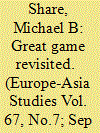

|
|
|
|
|
| Summary/Abstract |
During the second half of the nineteenth century, British and Russians fought, sometimes violently, in an Asian front that ranged from the Caucasus Mountains to the west to China's Xinjiang Province to the east. This rivalry, known as the Great Game, nearly erupted into a full-scale war in 1885. Following the Russian Revolution and Civil War, the rivalry between the Soviet Union and Great Britain re-emerged. This article describes the Anglo–Soviet rivalry in troubled, war-torn Xinjiang during the 1920s and 1930s, a time when Britain was a declining power and the Soviet Union a new ascendant power.
|
|
|
|
|
|
|
|
|
|
|
|
|
|
|
|
| 3 |
ID:
160677
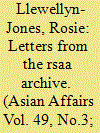

|
|
|
|
|
| Summary/Abstract |
In 2004 a collection of thirty-four letters from the Silk Road explorer Sir Aurel Stein was found in the archives of the Royal Society for Asian Affairs and catalogued, although not transcribed or studied. Neither of Stein's biographers, Jeannette Mirsky (published 1977), nor Annabel Walker (published 1995) knew about these letters, and there are no references to them in more recent publications either. What is perhaps even more interesting is that the Society's letters are addressed to a man whose name does not appear in any published works on Stein; a man who remains an elusive figure more than half a century after his death – Colonel Reginald Schomberg D.S.O. (1880-1958), an explorer and spy. This article analyses the contents of the letters, which shed light on a secret mission undertaken by Schomberg in Chinese Central Asia in the early 1930s.
|
|
|
|
|
|
|
|
|
|
|
|
|
|
|
|
| 4 |
ID:
095277
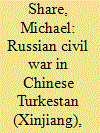

|
|
|
|
|
| Publication |
2010.
|
| Summary/Abstract |
A very important yet little known front in the Russian Civil War existed in neighbouring Xinjiang, a region in China's northwest, that was at that time self-governing. In Xinjiang, Russian White Commanders and their troops gained sanctuary, financial assistance, food and shelter from Chinese provincial leaders, and then used those sanctuaries to launch operations against Soviet forces. However, by 1921, Red Army troops destroyed any remaining organised White forces, which then melted into the Chinese landscape. The ramifications of the Russian Civil War in Xinjiang had important impacts on the people of Xinjiang, and on Russia and China as well.
|
|
|
|
|
|
|
|
|
|
|
|
|
|
|
|
| 5 |
ID:
131788
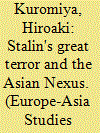

|
|
|
|
|
| Publication |
2014.
|
| Summary/Abstract |
Stalin's Great Terror of 1937-1938 did not stop at the Soviet borders: under Moscow's explicit instructions, it extended to Asia, particularly to the People's Republic of Mongolia and to Xinjiang or Chinese Turkestan. More people proportionately suffered from the Terror in Mongolia than in the Soviet Union. Stalin's terror operations in the Asiatic lands were implicitly directed against Japan, the main competitor for influence in the region.
|
|
|
|
|
|
|
|
|
|
|
|
|
|
|
|
| 6 |
ID:
128480
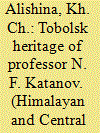

|
|
|
|
|
| Publication |
2013.
|
| Summary/Abstract |
Scholars of the Tyumen region systematically refer to the scientific heritage of unique scholar-Turcologist Nickolay Fyodorovich Katanov. After his successful graduation from oriental department of Saint Petersburg University in 1889, N. F. Katanov was sent to a long field trip by the Imperial Russian Geographic Society and Petersburg Academy of Science ' to Siberia, Northern Mongolia, Dzungaria and Chinese Turkestan. Here n he studied customs, household activities, language and folklore of the local Turkic peoples besides collecting, processing and preparing huge material for publication. Outstanding orientalist N. F. Katanov enriched indigenous Turcology with extraordinary scientific works concerning the Siberian Tatars. Katanov carried out labour-intensive work in defining and systematizing all proper names that led to the release of two-volume alphabetical index of names which appear in Folk literature samples of the Turkic tribes of V. V.
Radloff. The lion's share of these materials is data on onomastics of the Siberian Tatars.
|
|
|
|
|
|
|
|
|
|
|
|
|
|
|
|
| 7 |
ID:
119288
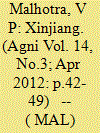

|
|
|
|
|
|
|
|